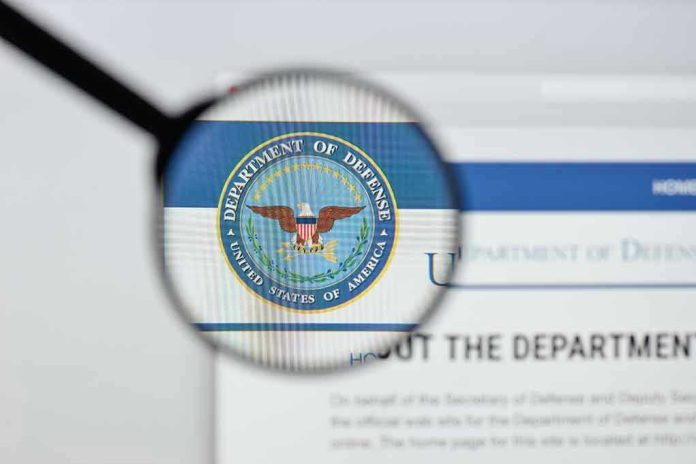
Hundreds of Defense Department civilians have volunteered to bolster border enforcement under President Trump, marking an unprecedented federal mobilization that directly challenges years of lax immigration controls and bureaucratic gridlock.
Story Snapshot
- Nearly 500 DoD civilians answered a White House call to support border and interior enforcement within 48 hours of an August 2025 memo.
- Assignments are voluntary and temporary, with civilians detailed to DHS agencies like ICE and CBP for up to 180 days.
- This large-scale civilian mobilization is a first in U.S. immigration enforcement, reflecting a “whole-of-government” approach to national security.
- The Trump administration frames the action as fulfilling campaign promises to restore law and order, address illegal immigration, and overcome agency staffing shortages.
Trump’s Border Surge: DoD Civilians Step Up in Historic Numbers
Following an internal Department of Defense memo, nearly 500 civilian employees volunteered within 48 hours to support the Department of Homeland Security’s mission at the U.S. southern border. The initiative was prompted by President Trump’s renewed focus on border security and mass deportation, with volunteers assigned to Immigration and Customs Enforcement (ICE) and Customs and Border Protection (CBP). Unlike past military deployments, this marks the first time such a large group of DoD civilians is directly involved in immigration enforcement. The rapid response highlights both the urgency of the administration’s agenda and the frustration among federal employees over previous inaction on illegal immigration.
The application window for these assignments, which began with a USAJOBS posting on August 8, 2025, remains open until August 2026, indicating a long-term commitment to this operation. Volunteers are tasked with a range of missions, from intelligence analysis and detention support to logistics, with deployments not only at the border but also in interior cities where federal agencies report increased illegal activity. The details are strictly temporary—lasting up to 180 days—and are framed as voluntary, with civilians remaining under DoD employment but working alongside DHS personnel. This structure aims to address chronic staffing shortages at ICE and CBP while avoiding permanent transfers that could disrupt military readiness.
Why DoD Civilian Mobilization Matters for Border Security
This initiative comes at a time of increasing political division over immigration and mounting operational strain on federal agencies. Trump’s executive actions in 2025 intensified border enforcement and authorized this “whole-of-government” approach to mass deportations. The memorandum of understanding between DoD and DHS sets the stage for a new era of interagency cooperation—one that supporters argue is necessary to restore order and defend the nation’s sovereignty. For many conservatives, this is a long-overdue response to years of open-border policies and rising illegal crossings that have undermined the rule of law, strained local resources, and put American families at risk.
Volunteers are motivated by a mix of patriotism, career development, and personal conviction, stepping in where congressional gridlock and bureaucratic inertia have failed to deliver results. Their roles are critical in supporting ICE and CBP operations, especially as enforcement expands into urban centers like Washington, D.C., where federal agents have recently detained individuals suspected of violating immigration laws. This visible surge in enforcement is intended to send a clear message to would-be border crossers and to demonstrate that the administration is serious about upholding immigration law and national security priorities.
Impacts, Risks, and the Road Ahead
In the short term, the influx of DoD civilians is expected to dramatically increase the capacity of DHS to detain, process, and deport illegal immigrants. However, the scale of civilian involvement also raises important questions. National security experts warn that blurring the lines between military, civilian, and law enforcement roles could lead to mission creep and morale issues, while labor advocates question the true voluntariness and career incentives for participating employees. From a constitutional perspective, conservatives must remain vigilant to ensure that these efforts strengthen—not erode—individual rights, due process, and the clear separation of federal powers.
Hundreds of DoD civilians accept call of duty in southern border mission under Trump’s order https://t.co/T8NGXg01AT #FoxNews
— Kelly lauritsen (@LauritsenKelly) August 24, 2025
Long-term, this operation may set a precedent for future crises, normalizing cross-agency civilian details for domestic enforcement missions. The political implications are significant: the Trump administration’s decisive action is likely to energize supporters who have long demanded secure borders and responsible government, while also drawing legal and ethical scrutiny from critics who warn of civil liberties risks. As recruitment continues and the scope of enforcement broadens, the success and impact of this unprecedented mobilization will depend on robust oversight, clear legal boundaries, and ongoing engagement with Congress and the American public.
Sources:
Hundreds of DoD civilians accept call of duty in southern border mission under Trump’s order
Pentagon civilian workers apply to support ICE border operations
Pentagon asks its civilian employees if they want to work for ICE
Instagram post confirms ongoing recruitment and assignment duration
Immigration: DoD civilian employees offered volunteer positions to aid ICE operations






